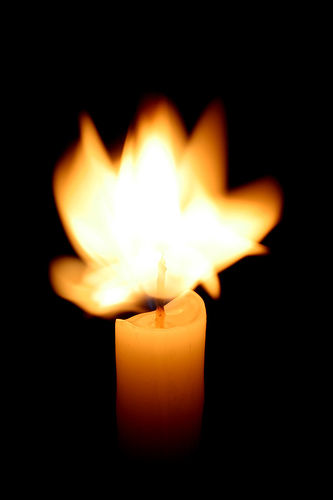FWP:
SETS == DEFINITION; REPETITION;
SYMMETRY; WORDPLAY
CANDLE: {39,1}
GATHERINGS: {6,3}
In this verse, the wordplay is such a tour de force that even Nazm is moved to admiration at how informally, with what ease and unforcedness, it is deployed. Just consider his inventory of the verse's wordplay: zabān [tongue, language] and ahl-e zabān ['people of the tongue'; 'masters of language'] and marg [death] and ḳhāmoshī [silence] and bazm [gathering] and raushan [illumined, radiant] and zabānī ['from the tongue', orally]-- and of course shamʿa , the candle itself, with its 'tongue' of flame and its inevitable 'death'.
All this wordplay is beautifully integrated, and the most enjoyable part of it is the use of the 'people of tongue/language' [ahl-e zabān]. In Urdu literary tradition these are the people who police the boundaries of proper usage-- they are the ones who are able to declare that a certain idiom or turn of phrase is acceptable or matrūk , 'rejected'. They are the educated poetry-knowing native speakers, the ones whom poets and commentators address when they say things like 'Only the ahl-e zabān will know the real pleasure of this'.
So in all this tangle of elegant multiple wordplay, what is actually being said? Except at a basic level, it's impossible to be too sure. At a basic level, the connection of the candle-- which in English too, fortunately, has its 'tongue' of flame-- and the ahl-e zabān , the 'people of tongue/language', is clear. Both of them will be dead if they lose their 'tongues'; in Urdu a 'silent' (or 'killed') candle is an extinguished one. This situation becomes illumined [raushan] 'by the tongue' [zabānī] of the candle. In short, in the language of poets, critics, and candles, death is silence and/or silence is death.
This is not, after all, a very exciting or revelatory thing to say. The pleasure of the verse lies in its wordplay, and its sound effects-- especially the repeated word zabān . With three slightly differing variations ( zabān , zabāñ , zabānī ) of the same word amidst all that related wordplay, the verse can hardly help but feel mysterious and even a bit hypnotic.
Other verses about the tongue of the candle: {75,3}; {81,9x}.

Nazm:
In this verse, zabān and ahl-e zabān and marg and ḳhāmoshī and bazm and raushan and zabānī -- all these are words connected by ẓilʿa to the candle, but all are used unostentatiously [be-takalluf]. (76)
== Nazm page 76; Nazm page 77